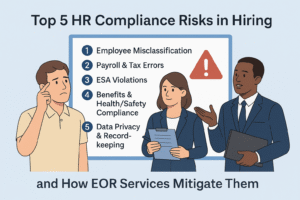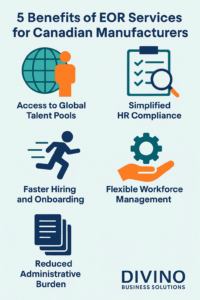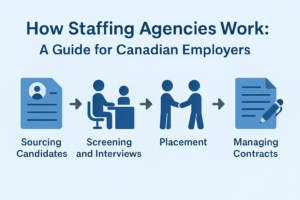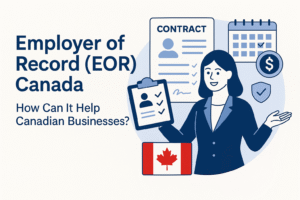Hiring in Cambridge, Ontario can be tough. With over 10,000 businesses competing for workers, employers often find themselves short on candidates, struggling with lengthy processes, or facing high hiring costs. A ManpowerGroup survey found 77% of Canadian companies struggle to find qualified talent, and Ontario is above the national average.
This blog explores six common hiring challenges in Cambridge. Each section highlights the problem and offers practical solutions. If it still feels overwhelming, remember: working with the best employment agency in Cambridge, Ontario can simplify everything.
1. Talent Shortages in a Competitive Market
The Problem
Cambridge’s economy is strong and diverse. Manufacturing, technology, and healthcare employers compete for a limited talent pool. Many roles — especially skilled trades and IT — remain open for months. Talent shortages force companies to pay more overtime or delay growth.
Solutions
- Expand your reach. Post beyond Cambridge, consider remote work options, and tap into nearby cities.
- Strengthen your employer brand. Promote culture, benefits, and career growth on your website and social channels.
- Encourage referrals. Offer bonuses to employees who recommend strong candidates.
- Work with agencies. Recruiters often know candidates not actively applying. Up to 70% of jobs are filled through hidden networks — agencies can access these connections for you.
2. Limited Reach to Qualified Candidates
The Problem
Small and mid-sized businesses often lose visibility compared to big names. Many great candidates — especially passive ones — never see your job ads.
Solutions
- Polish your careers page. Keep it current and welcoming.
- Write clear job postings. Use simple titles and highlight perks.
- Attend local events. Job fairs and networking sessions build brand awareness.
- Leverage recruiters. The best employment agencies in Cambridge, Ontario can reach passive candidates directly, opening doors you can’t through ads alone.
3. Slow Hiring Processes
The Problem
The average time to fill a role is 42 days. In a fast-moving job market, delays cause top candidates to drop out. For employers without HR teams, juggling applications, interviews, and reference checks can drag on too long.
Solutions
- Streamline steps. Batch interviews, use phone screens, and reduce unnecessary delays.
- Use technology. Applicant tracking systems and automated scheduling save time.
- Clarify decision-makers. Decide upfront who approves hires to prevent bottlenecks.
- Use agencies for speed. Staffing firms maintain pre-screened talent pools and can deliver a shortlist within days, not weeks.
4. Ensuring Quality Hires
The Problem
A bad hire is costly. The U.S. Department of Labor estimates it can equal 30% of first-year earnings. Beyond money, a poor fit can lower morale and productivity. Yet judging true skills and cultural fit is difficult with just resumes and interviews.
Solutions
- Define success clearly. Know the must-have skills and desired traits.
- Use multiple assessments. Combine structured interviews, skill tests, and references.
- Try temp-to-hire. Bring candidates on short-term first to confirm fit. About one-third of temps receive full-time offers.
- Rely on recruiters. The best agencies specialize by industry and often provide replacement guarantees if a placement doesn’t work out.
5. High Hiring Costs and Limited HR Resources
The Problem
Advertising, interviews, and turnover add up. For small Cambridge businesses, hiring eats into budgets and productivity. Managers often juggle HR on top of daily operations, making the process inefficient.
Solutions
- Measure cost-per-hire. Track advertising, tools, and time invested. Cut what doesn’t deliver.
- Focus on retention. Strong onboarding and growth opportunities reduce turnover costs.
- Use grants and subsidies. Ontario programs often cover training or wages for apprentices and new hires.
- Outsource wisely. While agencies charge fees (often 15–25% of salary for permanent hires), the speed and quality can offset wasted time, lost productivity, and bad hires.
6. Seasonal and Unexpected Staffing Needs
The Problem
Cambridge businesses face seasonal spikes, like manufacturing peaks or holiday retail surges. Sudden absences or new projects also create urgent hiring needs. Traditional recruiting is too slow for these situations.
Solutions
- Plan ahead. Recruit seasonal staff early and re-hire proven workers.
- Cross-train your team. Multi-skilled employees create flexibility.
- Maintain contractor relationships. Build a bench of reliable freelancers.
- Partner with agencies. Staffing firms excel at delivering pre-screened temps fast, sometimes within 24–48 hours. Many offer 24/7 support for urgent requests.
Why Partner With Divino Business Solutions?
Hiring in Cambridge is competitive, but you don’t need to go it alone. At Divino Business Solutions, we connect employers with the right candidates quickly and effectively.
✅ Save time
✅ Reduce costs
✅ Hire with confidence
If you’re ready to stop struggling with recruitment, leave your hiring to us — and we’ll take it from there.
FAQs
Q: What does it cost to use an agency?
A: Permanent hires usually cost 15–25% of first-year salary. Temp workers are billed hourly with a markup but at Divino this will be significantly lower.
Q: How fast can you fill roles?
A: Temps often start within 24–48 hours. Permanent hires take weeks instead of months. Divino can often do it hours.
Q: Can I hire short-term staff?
A: Yes. Agencies supply seasonal or project-based workers and handle payroll.
Q: How do I choose the best employment agency in Cambridge, Ontario?
A: Look for agencies licensed in Ontario, with local expertise and proven results.




